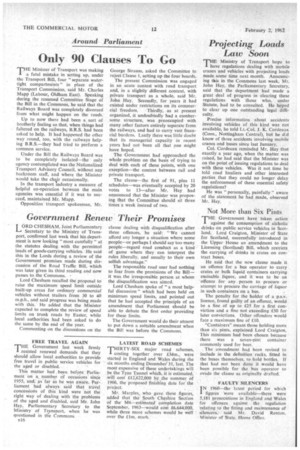Only 90 Clauses To Go
Page 50

If you've noticed an error in this article please click here to report it so we can fix it.
THE Minister of Transport was making a fatal mistake in setting up, under the Transport Bill, four "separate watertight compartments" in place of the Transport Commission, said Mr. Charles Manp (Labour, Oldham East). Speaking during the resumed Committee Stage of the Bill in the Commons, he said that the Railways Board was completely divorced from what might happen on the roads.
Up to now there had been a sort of brotherly feeling so that, when things had faltered on the railways, B.R.S. had been asked to help. It had happened the other way round, too, with the railways helping B.R.S.—they had tried to perform a common service.
Under the Bill the Railways Board was to be completely isolated—the only agency contemplated was the Nationalized Transport Advisory Council, without any backroom staff, and where the Minister would take the chair occasionally. In the transport industry a measure of helpful co-operation between the main agencies was essential if it was to succeed, maintained Mr. MaPP.
Opposition transport spokesman, Mr. George Strauss, asked the Committee to reject Clause 1, setting up the four boards.
The present Commission was engaged in an acute contest with road transport and, in a slightly different context, with private transport as a whole, said Mr. John Hay. Secondly, for years it had existed under restrictions on its commer cial freedom. Thirdly, as at present organized, it undoubtedly had a cumbersome structure, was preoccupied with many other factors entirely separate from the railways, and had to carry vast financial burdens. Lastly there was little doubt that its managerial capacity in recent years had not been all that one might have hoped.
The Government had approached the whole problem on the basis of trying to deal with each of these points, with one exception—the contest between rail and private transport.
The clause—the firs t of 91, plus 11 schedules—was eventually accepted by 20 votes to 13—after Mr. Hay had announced that the Minister was proposing that the Committee should sit three times a week instead of two.




























































































































